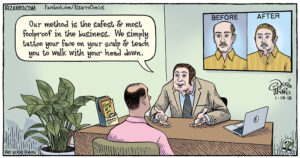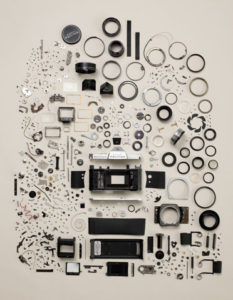 Maybe you’ve heard this little story about aliens visiting us. Aliens, on first observing humans, might think we serve dogs. As soon a dog poops, their attending human quickly recovers the precious gift from the dog in a special bag.
Maybe you’ve heard this little story about aliens visiting us. Aliens, on first observing humans, might think we serve dogs. As soon a dog poops, their attending human quickly recovers the precious gift from the dog in a special bag.
Maybe future historians, after reviewing the actions of modern Americans, might assume the American religion was built around a god called Gun. They’d see the records of mass killings using guns occurring fairly regularly, daily self sacrifices using guns, and the constant settling of disputes (usually with someone close to the shooter) with guns. Future historians would even discover there’re more pre-schoolers shot dead in America (about 75) than police officers are in a typical year.
These future historians might speculate that mental illness, criminal activity, or racial issues were the root of the problem before coming to the conclusion current researchers have come to. Namely that American violence comes down to the vast number of guns in America. These findings could lead future historians to theorize that the US culture’s predominate god is named Gun.
They’re a couple of good articles about in the NYT , here and here, about gun violence and possible solutions. Here’re a few takeaways from the articles. The bottom line is this: The only variable explaining the high rate of mass shootings in America is its astronomical number of guns.
Worldwide, a country’s rate of gun ownership correlated with the odds it would experience a mass shooting. This relationship held even when excluding the US, indicating that it couldn’t be explained by some other factor particular. And it held when controlled for homicide rates, suggesting that mass shootings were better explained by a society’s access to guns than by its baseline level of violence.
Americans make up about 4.4% of the global population but own 42% of the world’s guns. Only in the U.S. do we lose one person every 15 minutes to gun violence.
While there’s crime in other countries, American crime is simply more lethal. A New Yorker is just as likely to be robbed as a Londoner, but the New Yorker is 54 times more likely to be killed in the process.
While mass shootings can happen anywhere, they are only a matter of routine in the US.
In 2013, American gun-related deaths included 21,175 suicides, 11,208 homicides and 505 deaths from accidental discharge. That same year in Japan, a country with one-third America’s population, guns were involved in only 13 deaths. America’s gun ownership rate is 150 times higher than Japan’s.
The US is one of only three countries, along with Mexico and Guatemala, that begin with the assumption that people have an inherent right to own guns. But the US has determined that relatively unregulated gun ownership is worth the cost to society.
Gun safety or reducing gun violence should be framed as a public health issue using auto safety as a model with its constant efforts to make the products safer and limiting access by people who are most likely to misuse them.
We don’t ban cars, but we work hard to regulate them – and limit access to them – so as to reduce the death toll they cause. This has been spectacularly successful, reducing the death rate per 100 million miles driven by 95% since 1921.
States where guns are more regulated tend to have lower gun death rates.
But the problem is that lax laws too often make it easy not only for good guys to get guns, but also for bad guys to get guns. The evidence is overwhelming that overall more guns and more relaxed gun laws lead to more violent deaths and injuries. One study found that a gun in the house was associated with an increased risk of a gun death, particularly by suicide but also by homicide.
Although it’s mass shootings that get our attention, they’re not the main cause of loss of life. Much more typical is a friend who shoots another, a husband who kills his wife – or, most common of all, a man who kills himself.
Skeptics will say that if people want to kill themselves, there’s nothing we can do. In fact, it turns out that if you make suicide more difficult, suicide rates drop.
After tightening gun laws, firearm homicide rates dropped 40 percent in Connecticut. And after Missouri eased gun laws, gun homicide rates rose 25 percent.
Our laws have often focused more on weapons themselves (such as the assault weapons ban) rather than on access. In many places, there is more rigorous screening of people who want to adopt dogs than of people who want to purchase firearms. A car or gun is usually safe in the hands of a 45-year-old woman with no criminal record, but may be dangerous when used by a 19-year-old felon with a history of alcohol offenses or domestic violence protection orders.
Sunday’s horror at a church in Texas was 100% predictable. After each such incident, we mourn the deaths and sympathize with the victims, but we do nothing fundamental to reduce our vulnerability. The question isn’t whether we’ll restrict firearms, but where to draw the line. The real impetus for change will come because the public favors it.
 Lots of things are easier to get into than to get out of, like marriage or buying a new car. So drilling down into the potential ramifications is a good idea. Here’s a good trick from from a contributor on Kevin Kelly’s CoolTools site.
Lots of things are easier to get into than to get out of, like marriage or buying a new car. So drilling down into the potential ramifications is a good idea. Here’s a good trick from from a contributor on Kevin Kelly’s CoolTools site.







